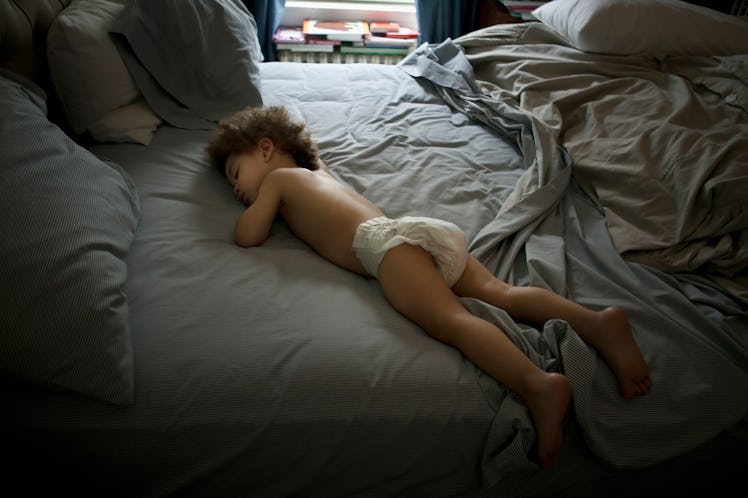How Much Sleep Do Babies, Toddlers, And Kids Need?
Follow these age-based guidelines to make sure your kids are getting enough sleep.

Sleep seems to be a universal need among living things — even if what constitutes a good night’s rest varies wildly: Brown bats practically sleep their lives away (at 20 hours a day) while giraffes get by on a couple of hours a night. People, too, have highly individualized sleep requirements; some thrive on late nights, while others prefer to crash early and rise before the sun. Just think about how much sleep you need compared with your spouse. With children, however, it’s natural to worry about how many hours of sleep kids need as they grow.
“Adults tend to burn both ends of the candle and live pretty sleep-deprived lives,” says Michael Goodstein, M.D., a pediatrician based in Pennsylvania. “Babies, on the other hand, auto-regulate sleep like they do food.” In other words, if they need it, they’ll get it, and if they don’t, they won’t.
In terms of sleep requirements, the average human infant falls somewhere between the owl monkey and the tiger, at an average of 16 hours a day. But as babies become toddlers and then little kids, their sleep needs change dramatically by age. Most kids’ sleep needs fall within a range that experts deem necessary in order to accommodate the important developmental changes that happen largely during periods of rest. If they’re straying too far from the guidelines, parents need to act.
How Much Sleep Do Newborns And Infants Need?
The National Sleep Foundation recommends newborns (0-3 months) get 14 to 17 hours of sleep and infants (4-11 months) get 12 to 15 hours.
Why do newborns and infants require so much sleep? “Mostly, because they are growing so rapidly,” says Goodstein. “A baby doubles in size in the first six months, and triples in size by one year. It’s a critical period of development, and sleep plays a crucial role in allowing these changes to take place.”
Thankfully, during the first 12 months, sleep is just another reflex, and in most cases babies will meet their sleep needs instinctively.
“If you have a baby sleeping only 10 hours, something else is going on with his health,” says Goodstein. Pain is one major reason for sleep insufficiency in young kids. “Gastrointestinal issues are a common problem we see that interferes with a child’s ability to sleep,” he says. If your little one is struggling to get within an hour of the recommendations, talk with your pediatrician.
How Much Sleep Does A Toddler Need?
The National Sleep Foundation recommends that toddlers (1-2 years) get 11 to 14 hours of sleep. Around this time — usually at 18 months — toddlers drop from two naps to one. Nighttime sleep usually lasts for about 10 to 12 hours, and daytime naps make up the extra 1 to 2 hours.
How Much Sleep Do Kids Need?
The National Sleep Foundation preschoolers (3-5 years) get 10 to 13 hours and kids from 6- to 13-years-old get 9 to 11 hours. Although sleep needs decrease as kids get older, school-age kids still require more than adults do (9 to 11 hours versus 7 to 9 hours). That’s partly due to the emotional and mental growth happening during this stage of life.
“The brain is a relatively immature organ. It doesn’t finish developing until you are a young adult,” explains Goodstein. Much of this development occurs during sleep hours.
For older kids, sleep is less of an involuntary reflex and sometimes can be a battleground for control. (Who, me? Bed now? No way!) But it’s just as important for your 6-year-old to meet their sleep needs as it is a 1-year-old.
“Sleep deprivation in older kids has negative connotations,” says Dr. Goodstein. “We know it is associated with issues including obesity and delayed cognitive development.” If your school-age child is falling below the minimum sleep recommendations, try the stealth approach, moving their bedtime forward by 15 minutes a night, for several nights in a row. (Of course, what this really means is beginning their pre-bed routine 15 minutes earlier, since it’s the wind-down to lights out that makes or breaks the ease of drifting off.)
This article was originally published on